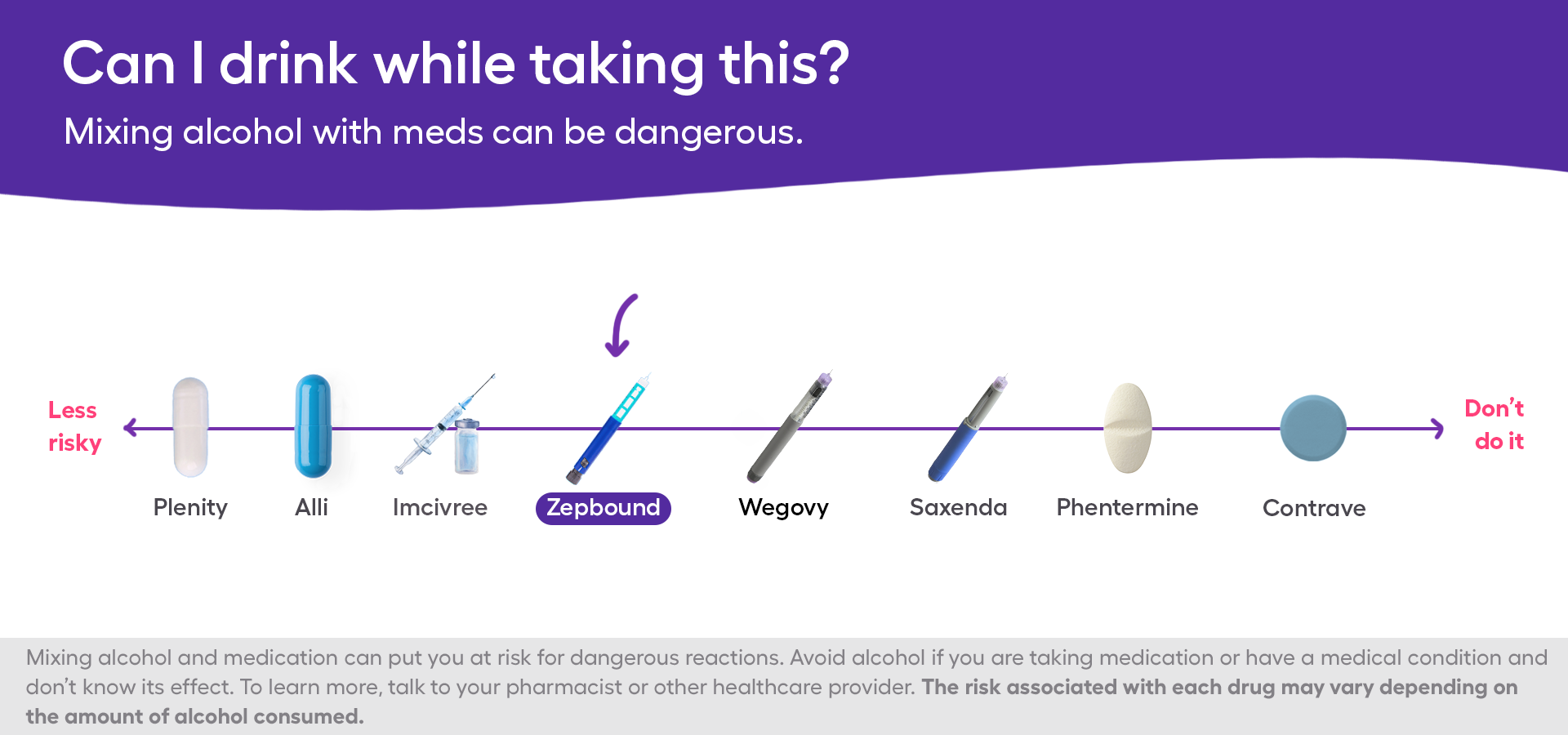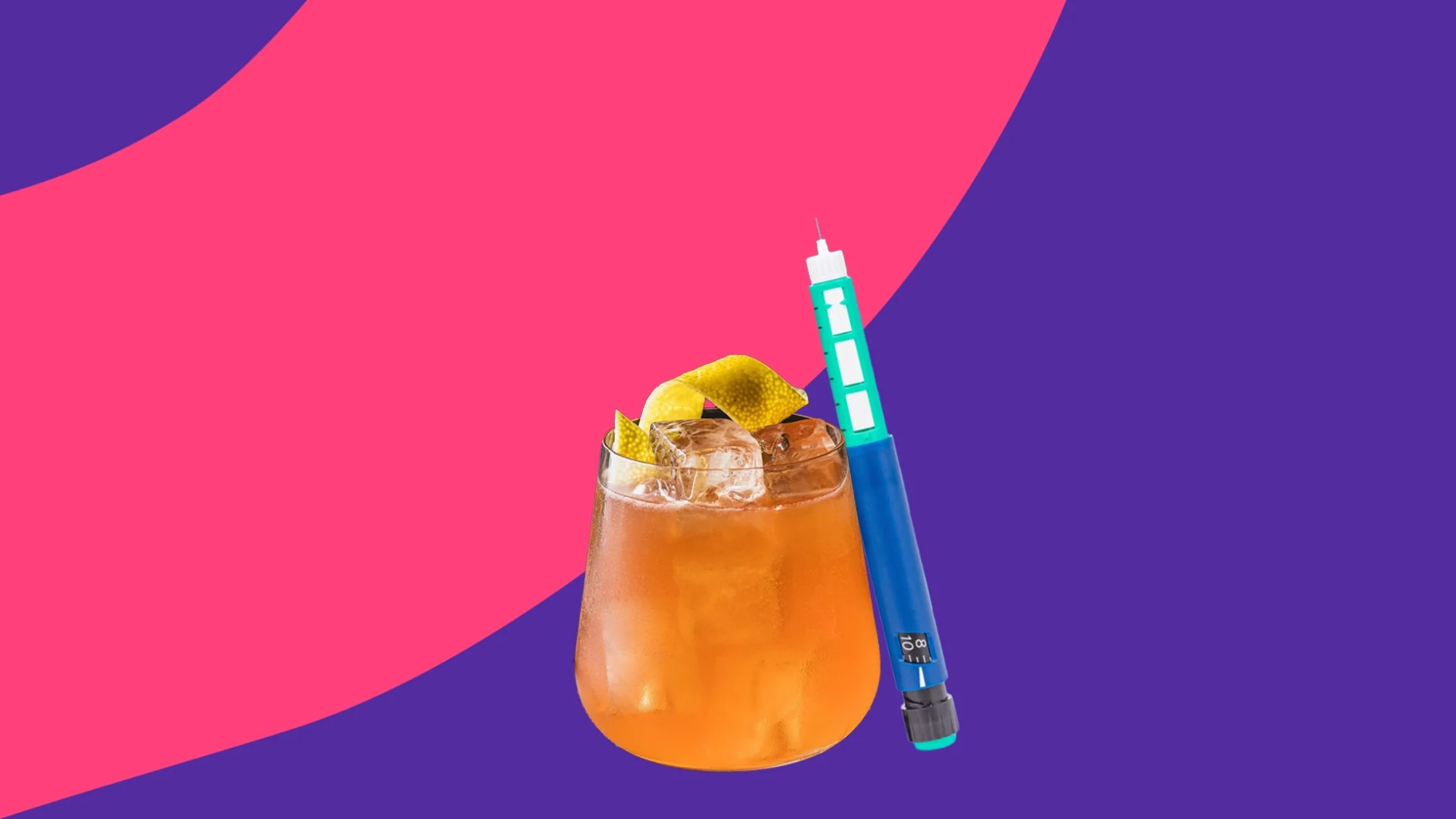Key takeaways
Drinking alcohol while on Zepbound may increase the risk of side effects, including nausea, indigestion, and blood sugar changes.
People with conditions like kidney problems or a history of pancreatitis are at a higher risk of serious complications if they drink while on Zepbound.
Some people may be able to drink in moderation with Zepbound, but it’s best to consult a healthcare provider.
Avoiding alcohol while taking Zepbound may help maximize the medication’s effectiveness and support weight-loss goals.
No matter the time of year, there’s always a family get-together, wedding celebration, or festive party just waiting to sabotage your weight loss goals—with delicious treats and alcoholic beverages. If you’re taking Zepbound (tirzepatide), there’s an added layer to consider besides the extra calories: Is it safe to drink while taking this medication? There’s no direct interaction, but there are some potentially negative effects. Both Zepbound and alcohol affect your blood sugar. Plus, they have overlapping side effects, such as nausea and kidney damage. For some, it’s okay to have an occasional drink with friends while taking this medication. However, for others, the answer may not be so clear-cut, especially if you react strongly to alcohol or have certain medical problems that can increase the risk of side effects. Here’s what you need to know.
Can you drink while taking Zepbound?
Drinking alcohol while on Zepbound is not generally recommended without guidance from a doctor or healthcare provider. Mixing the two may increase the risk of side effects, some of which may be potentially serious. If you decide to drink alcohol, you’ll want to limit your intake.
Drinking in moderation may be safe if you have no underlying health condition and are not taking medications that could interact negatively with alcohol. In addition, it’s important to consider your personal tolerance levels and to avoid drinking on an empty stomach. Drinking in moderation means:
- For men: Up to 2 standard drinks per day, not exceeding 14 drinks per week
- For women: Up to 1 standard drink per day, not exceeding seven drinks per week
In any case, it’s best to consult a healthcare professional who can assess your overall condition and offer appropriate medical advice. Once you have a better grasp of how Zepbound affects you and are aware of your reactions to alcohol, you’ll be in a better position to find out whether drinking is appropriate for you.

What happens if you mix Zepbound and alcohol?
Mixing Zepbound with alcohol may lead to various health problems, including side effects like nausea and indigestion. In more serious cases, alcohol may increase the severe side effects of Zepbound, such as dangerously low blood sugar levels and inflammation of the pancreas.
Nausea
Zepbound may cause nausea, as it affects how the stomach empties. Alcohol may worsen nausea by irritating the stomach lining, causing an increased feeling of sickness.
As a result, people taking Zepbound might experience more intense or frequent nausea when drinking alcohol.
Indigestion
Indigestion can also be a concern when combining Zepbound and alcohol. This medication affects digestion by slowing down how fast food moves through the stomach. Alcohol, on the other hand, can increase stomach acid production, which may lead to an upset stomach. Combining both substances may lead to common side effects like bloating and stomach discomfort.
Blood sugar changes
Combining Zepbound and alcohol may affect blood sugar levels. Zepbound is known to increase insulin production to control blood sugar levels. Alcohol consumption could cause unpredictable swings in blood sugar levels, leading to episodes of low or high blood sugar. People with Type 2 diabetes who use Zepbound may need to monitor their glucose levels regularly if they consume alcohol. Sudden changes in blood sugar can be dangerous and may require a hospital visit in severe cases.
Kidney problems
Mixing Zepbound and alcohol may sometimes lead to kidney problems. Alcohol is a diuretic, which means it can lead to dehydration. Zepbound has been linked to kidney injury, especially due to its effects on the digestive system, such as vomiting and diarrhea. Dehydration from alcohol may stress the kidneys, especially when Zepbound is also being used.
Increased risk of pancreatitis
Some people have reported experiencing inflammation of the pancreas (pancreatitis) with Zepbound. Symptoms of pancreatitis can include severe abdominal pain, nausea, vomiting, fever, and a rapid pulse. Clinical trials have also shown that drinking alcohol is a major risk factor for pancreatitis, especially in people with a history of heavy, chronic alcohol use. Therefore, mixing Zepbound and alcohol may lead to an increased risk of pancreatitis.
How serious or frequent these effects are can differ from one person to another. It’s always best to talk to a healthcare provider for medical advice and to make sure you’re using medications and consuming alcohol safely.
Are certain people at greater risk of side effects?
Certain individuals may have a higher risk of experiencing side effects from Zepbound, especially when combined with alcohol. People with existing health conditions might be more vulnerable. Those who may be at greater risk of side effects include:
- People with Type 2 diabetes due to an increased risk of low blood sugar (hypoglycemia)
- Those with pancreatic problems due to an increased risk of pancreatitis
- Individuals with kidney problems due to an increased risk of kidney injury
In addition, people who are sensitive to alcohol’s effects or who regularly experience side effects from Zepbound may be at a higher risk of gastrointestinal side effects like nausea, vomiting, diarrhea, and an upset stomach.
People who fall into these higher-risk groups should talk to their healthcare providers before starting Zepbound or any new medicine. It’s important to keep an eye out for any unusual reactions, especially if you drink alcohol while using the medication.
How long after taking Zepbound can you drink alcohol?
Drinking alcohol while Zepbound is still in your system may increase side effects. Therefore, it’s important to consider how long Zepbound stays in the body to determine whether it’s safe to drink alcohol after taking Zepbound.
That’s where half-life comes in. The half-life of a drug is the time it takes for half of the drug to be removed from the body. For Zepbound, the half-life is about five days. Everyone processes medications differently, but generally, it takes around five to six half-lives for a medication to be mostly cleared from the body.
In other words, it could take around 25 to 30 days to eliminate Zepbound from the body completely. Still, most of the drug’s effects, including its side effects, may wear off long before then, so you can gauge whether drinking alcohol is safe for you with guidance from a healthcare provider.
Other considerations while taking Zepbound
When taking Zepbound, there are a few different factors to keep in mind to ensure you’re using it safely besides watching your alcohol intake. These factors may include drug interactions and other warnings or precautions.
Zepbound may interact with other prescription drugs or over-the-counter medications. Therefore, it’s important to tell your healthcare provider about all the medications and supplements you are taking. For example, if you use insulin or medications that lower blood sugar (like sulfonylureas), your healthcare provider might need to adjust your doses to prevent low blood sugar levels. Also, Zepbound can slow down how quickly food leaves your stomach, which might affect how well other oral medications work.
People with specific health conditions should use Zepbound with caution. Those who are breastfeeding or pregnant may need to discuss potential risks with their doctor. It’s also important to tell your healthcare provider about any history of severe gastrointestinal diseases or pancreatitis.
Zepbound can lead to some serious side effects, although they are rare. Some people may experience allergic reactions, which can be quite severe and cause symptoms like hives, swelling of the face or throat, and difficulty breathing. Zepbound also carries a boxed warning of a potentially increased risk of thyroid cancer. As a result, Zepbound is not recommended for anyone with a personal or family history of thyroid cancer or multiple endocrine neoplasia syndrome type 2 (MEN 2).
Which weight loss medications are not affected by alcohol?
There are other weight loss drugs out there, and they each may have different risks when it comes to drinking alcohol. In general, however, it’s not recommended to take any weight-loss medications with alcohol. Weight-loss medications that may interact with alcohol, whether directly or indirectly, include:
- GLP-1 agonists, such as Wegovy (semaglutide) and Saxenda (liraglutide)
- Sympathomimetic appetite suppressants, such as Adipex-P (phentermine) and Tenuate (diethylpropion)
- Combination medications, including Contrave (bupropion and naltrexone)
- Lipase inhibitors, like Alli (orlistat)
- SGLT2 inhibitors, such as Invokana (canagliflozin) and Farxiga (dapagliflozin)
- Melanocortin 4 receptor (MC4R) agonists, such as Imcivree (setmelanotide)
Besides the risk that alcohol can interact with medications, it’s a good idea for other reasons to steer clear of drinking if you’re trying to lose weight. Alcohol can affect weight-loss plans in several ways.
One main problem is that alcoholic drinks often have a lot of calories, which can quickly add up and don’t provide much in terms of nutrition. Drinking alcohol may also affect the food choices a person makes and increase food cravings. For example, alcohol can lower a person’s self-control, which might lead to overeating or choosing unhealthy foods.
RELATED: Can you drink on Mounjaro?
The bottom line
If you’re using Zepbound to help with weight loss and are thinking about drinking alcohol, it can be helpful to know how they can affect each other. Mixing Zepbound and alcohol can lead to side effects like feeling sick, changes in blood sugar levels, and even serious problems like pancreatitis or kidney problems.
While some people may be able to drink in moderation, it’s generally best to avoid alcohol while taking Zepbound. Cutting back on alcohol may also help lower your calorie consumption from drinks and decrease the chances of overeating after a night out.
- Alcohol intolerance: What you need to know, Cedars Sinai (2023)
- Drinking levels and patterns defined, National Institute on Alcohol Abuse and Alcoholism (2024)
- Alcohol and gastric acid secretion in humans, Gut (1993)
- Alcohol use of diabetes patients: The need for assessment and intervention, Acta Diabetologica (2010)
- Tirzepatide, StatPearls (2024)
- What do we currently know about the pathophysiology of alcoholic pancreatitis: a brief review, Visceral Medicine (2020)
- Tirzepatide, a new era of dual-targeted treatment for diabetes and obesity: A mini-review, Molecules (2022)
- Zepbound highlights of prescribing information, U.S. Food and Drug Administration (2024)
- Tirzepatide, Memorial Sloan Kettering Cancer Center (2024)
- Alcohol intake and weight loss during an intensive lifestyle intervention for adults with overweight/obesity and diabetes, Obesity (2019)




